Strategic Direction: Policy in Cross Border Organizations
VerifiedAdded on 2023/06/17
|19
|6868
|325
Report
AI Summary
This report provides a critical analysis of strategic direction within cross-border and global organizations, with a focus on the World Trade Organization (WTO). It assesses the relationships between different partners in policy development, the influence of economic, political, and social factors, and the role of domestic and multinational interests in translating policy into strategy. The report also evaluates the policy positions of various partners, identifies potential tensions and conflicts of interest, and proposes models to support inter-organizational working. Key economic drivers are assessed, and the impact of new strategic imperatives on existing policies is evaluated. Furthermore, the report reviews current methods and theories of strategic planning and implementation in global organizations, proposes innovative alternatives, and utilizes quantitative and qualitative data to forecast future events, ultimately suggesting solutions to achieve better outcomes. The analysis considers cultural, social, and economic factors impacting policy development, highlighting the challenges and strategies for effective cross-border collaboration.
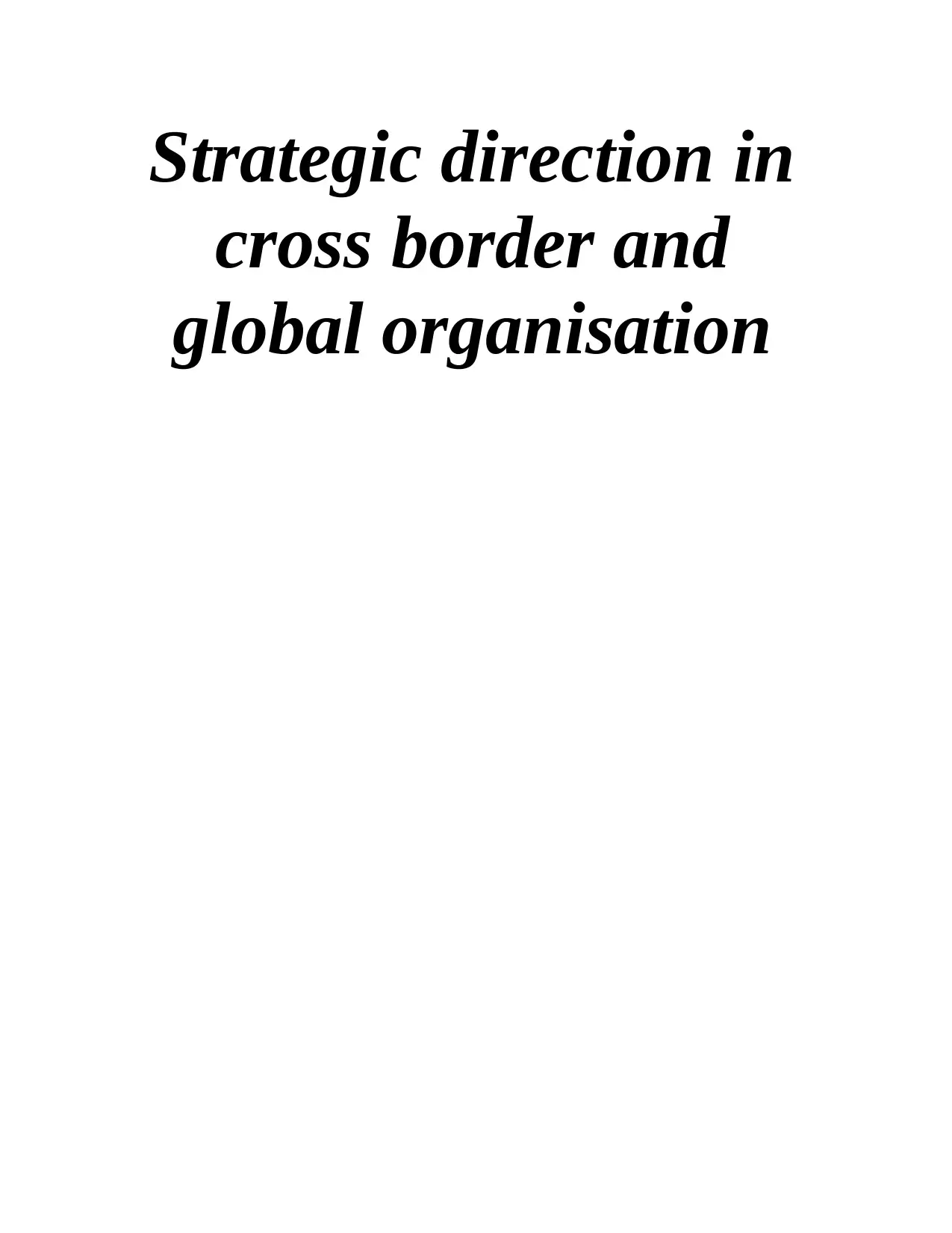
Strategic direction in
cross border and
global organisation
cross border and
global organisation
Paraphrase This Document
Need a fresh take? Get an instant paraphrase of this document with our AI Paraphraser
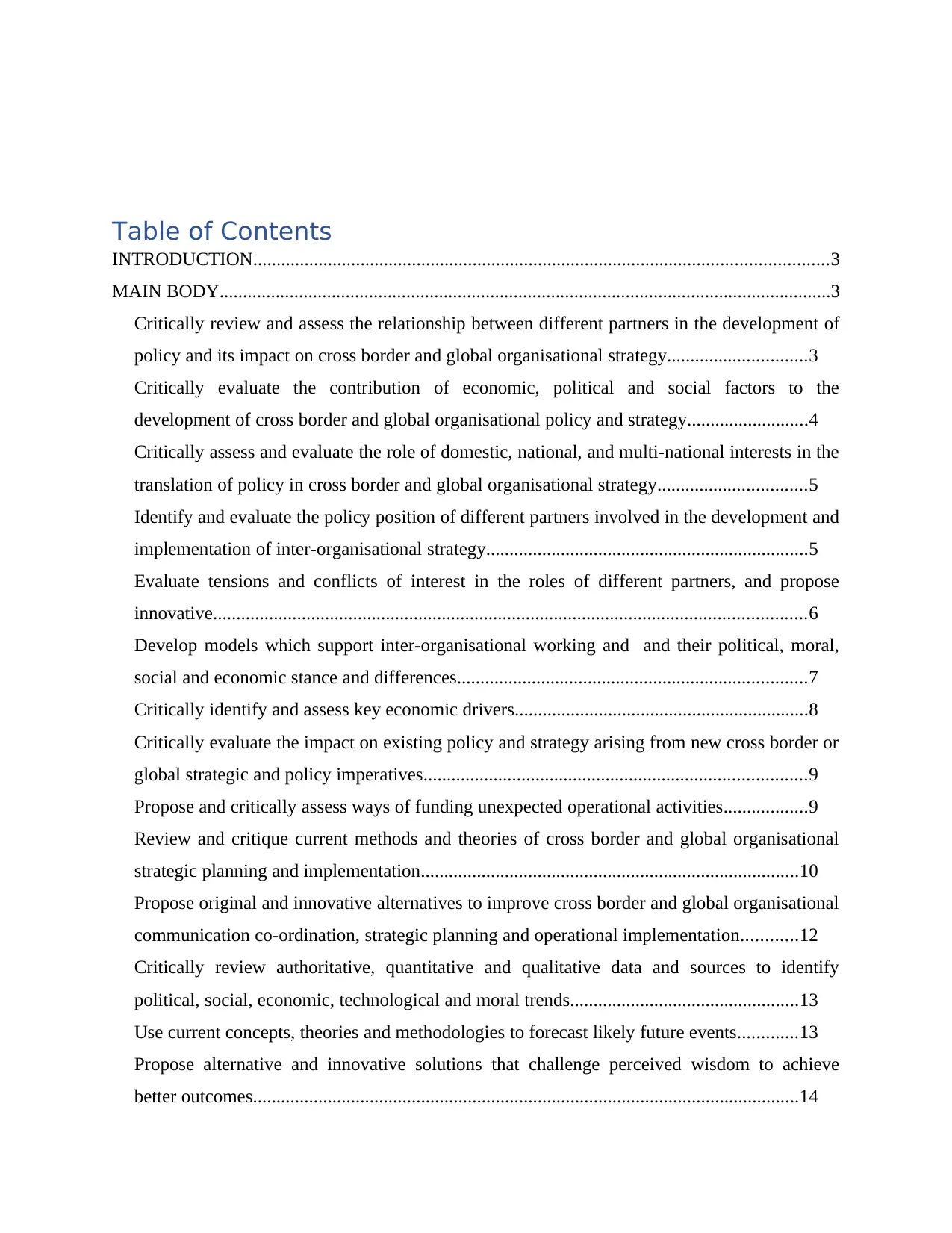
Table of Contents
INTRODUCTION...........................................................................................................................3
MAIN BODY...................................................................................................................................3
Critically review and assess the relationship between different partners in the development of
policy and its impact on cross border and global organisational strategy..............................3
Critically evaluate the contribution of economic, political and social factors to the
development of cross border and global organisational policy and strategy..........................4
Critically assess and evaluate the role of domestic, national, and multi-national interests in the
translation of policy in cross border and global organisational strategy................................5
Identify and evaluate the policy position of different partners involved in the development and
implementation of inter-organisational strategy.....................................................................5
Evaluate tensions and conflicts of interest in the roles of different partners, and propose
innovative...............................................................................................................................6
Develop models which support inter-organisational working and and their political, moral,
social and economic stance and differences...........................................................................7
Critically identify and assess key economic drivers...............................................................8
Critically evaluate the impact on existing policy and strategy arising from new cross border or
global strategic and policy imperatives..................................................................................9
Propose and critically assess ways of funding unexpected operational activities..................9
Review and critique current methods and theories of cross border and global organisational
strategic planning and implementation.................................................................................10
Propose original and innovative alternatives to improve cross border and global organisational
communication co-ordination, strategic planning and operational implementation............12
Critically review authoritative, quantitative and qualitative data and sources to identify
political, social, economic, technological and moral trends.................................................13
Use current concepts, theories and methodologies to forecast likely future events.............13
Propose alternative and innovative solutions that challenge perceived wisdom to achieve
better outcomes.....................................................................................................................14
INTRODUCTION...........................................................................................................................3
MAIN BODY...................................................................................................................................3
Critically review and assess the relationship between different partners in the development of
policy and its impact on cross border and global organisational strategy..............................3
Critically evaluate the contribution of economic, political and social factors to the
development of cross border and global organisational policy and strategy..........................4
Critically assess and evaluate the role of domestic, national, and multi-national interests in the
translation of policy in cross border and global organisational strategy................................5
Identify and evaluate the policy position of different partners involved in the development and
implementation of inter-organisational strategy.....................................................................5
Evaluate tensions and conflicts of interest in the roles of different partners, and propose
innovative...............................................................................................................................6
Develop models which support inter-organisational working and and their political, moral,
social and economic stance and differences...........................................................................7
Critically identify and assess key economic drivers...............................................................8
Critically evaluate the impact on existing policy and strategy arising from new cross border or
global strategic and policy imperatives..................................................................................9
Propose and critically assess ways of funding unexpected operational activities..................9
Review and critique current methods and theories of cross border and global organisational
strategic planning and implementation.................................................................................10
Propose original and innovative alternatives to improve cross border and global organisational
communication co-ordination, strategic planning and operational implementation............12
Critically review authoritative, quantitative and qualitative data and sources to identify
political, social, economic, technological and moral trends.................................................13
Use current concepts, theories and methodologies to forecast likely future events.............13
Propose alternative and innovative solutions that challenge perceived wisdom to achieve
better outcomes.....................................................................................................................14
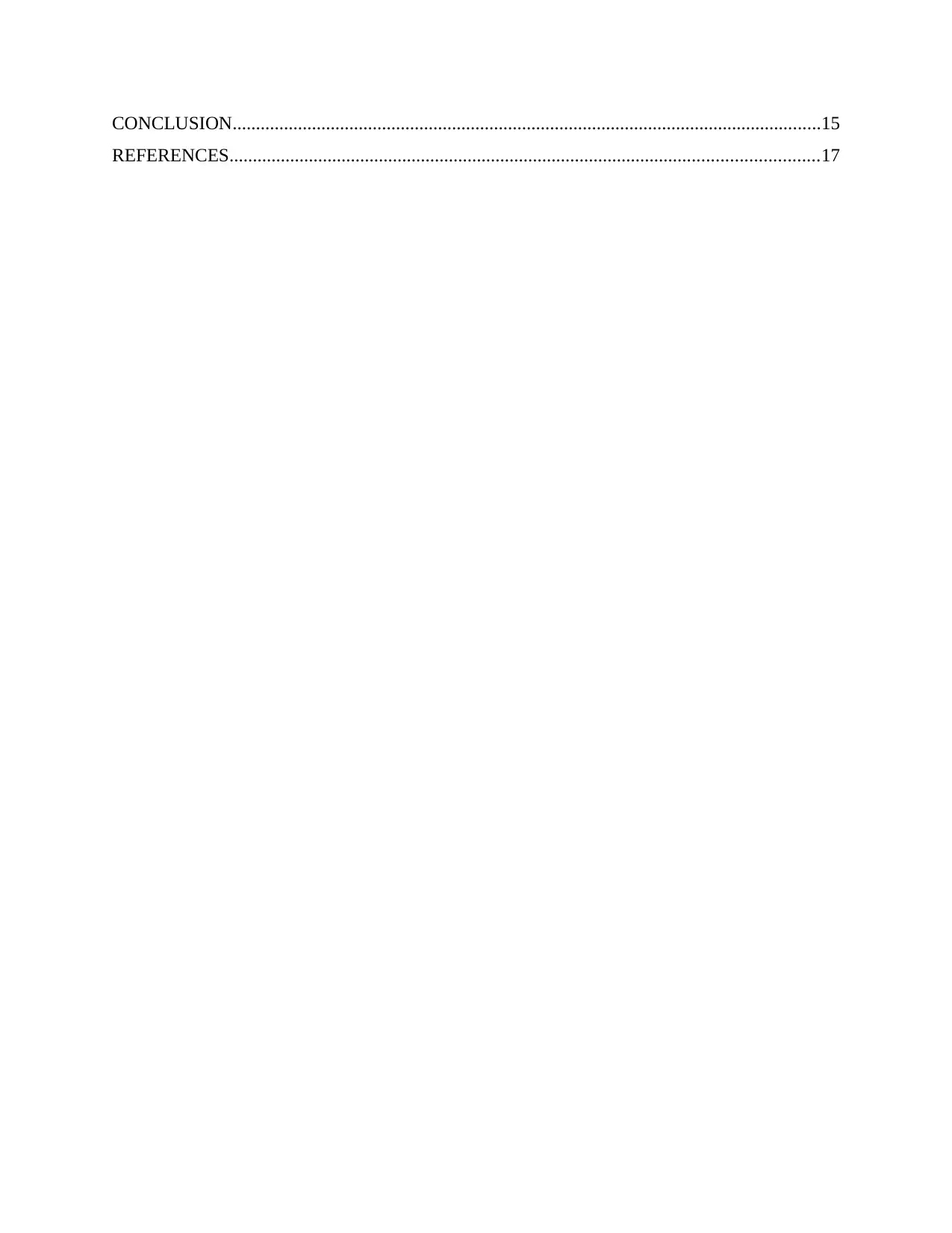
CONCLUSION..............................................................................................................................15
REFERENCES..............................................................................................................................17
REFERENCES..............................................................................................................................17
⊘ This is a preview!⊘
Do you want full access?
Subscribe today to unlock all pages.

Trusted by 1+ million students worldwide
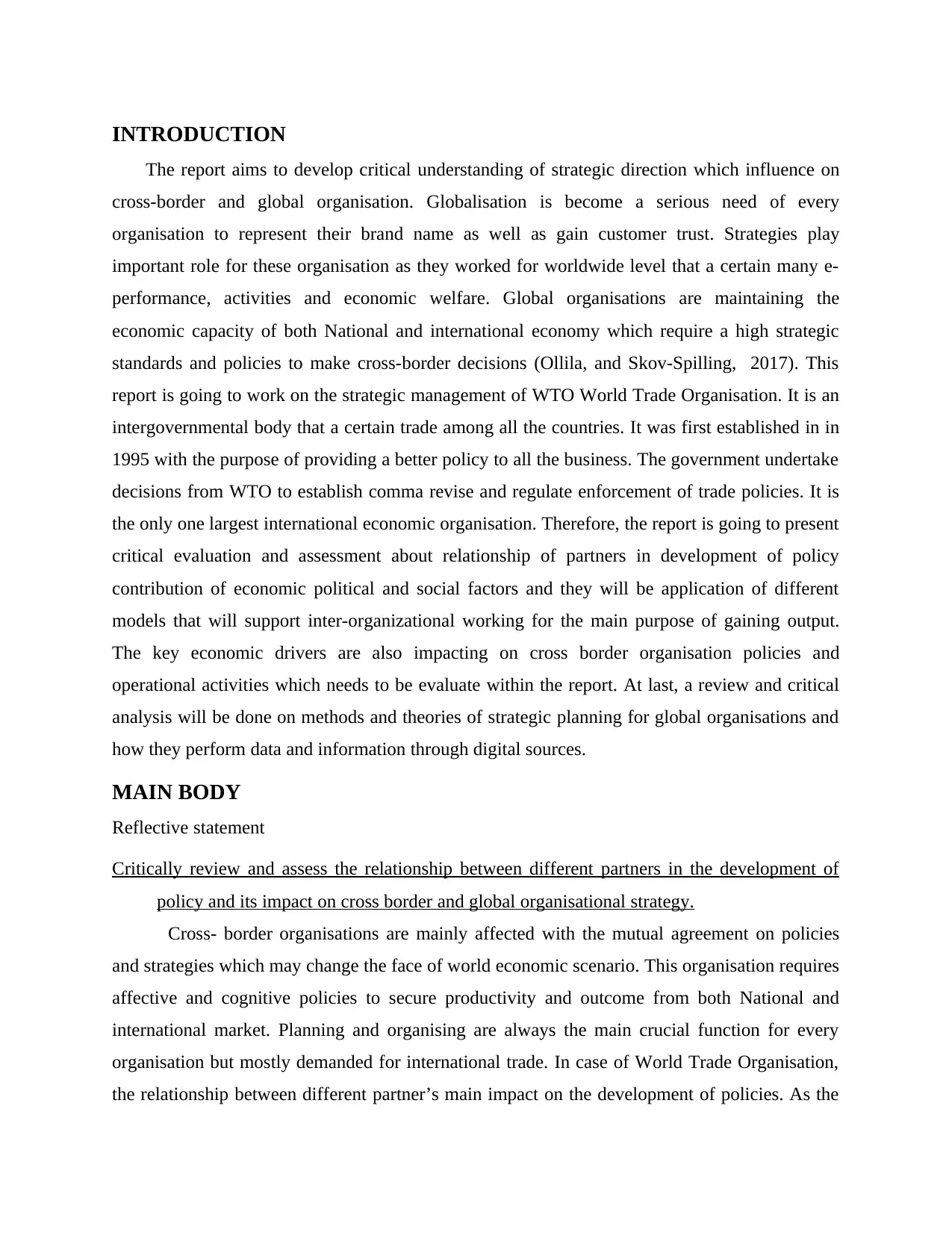
INTRODUCTION
The report aims to develop critical understanding of strategic direction which influence on
cross-border and global organisation. Globalisation is become a serious need of every
organisation to represent their brand name as well as gain customer trust. Strategies play
important role for these organisation as they worked for worldwide level that a certain many e-
performance, activities and economic welfare. Global organisations are maintaining the
economic capacity of both National and international economy which require a high strategic
standards and policies to make cross-border decisions (Ollila, and Skov-Spilling, 2017). This
report is going to work on the strategic management of WTO World Trade Organisation. It is an
intergovernmental body that a certain trade among all the countries. It was first established in in
1995 with the purpose of providing a better policy to all the business. The government undertake
decisions from WTO to establish comma revise and regulate enforcement of trade policies. It is
the only one largest international economic organisation. Therefore, the report is going to present
critical evaluation and assessment about relationship of partners in development of policy
contribution of economic political and social factors and they will be application of different
models that will support inter-organizational working for the main purpose of gaining output.
The key economic drivers are also impacting on cross border organisation policies and
operational activities which needs to be evaluate within the report. At last, a review and critical
analysis will be done on methods and theories of strategic planning for global organisations and
how they perform data and information through digital sources.
MAIN BODY
Reflective statement
Critically review and assess the relationship between different partners in the development of
policy and its impact on cross border and global organisational strategy.
Cross- border organisations are mainly affected with the mutual agreement on policies
and strategies which may change the face of world economic scenario. This organisation requires
affective and cognitive policies to secure productivity and outcome from both National and
international market. Planning and organising are always the main crucial function for every
organisation but mostly demanded for international trade. In case of World Trade Organisation,
the relationship between different partner’s main impact on the development of policies. As the
The report aims to develop critical understanding of strategic direction which influence on
cross-border and global organisation. Globalisation is become a serious need of every
organisation to represent their brand name as well as gain customer trust. Strategies play
important role for these organisation as they worked for worldwide level that a certain many e-
performance, activities and economic welfare. Global organisations are maintaining the
economic capacity of both National and international economy which require a high strategic
standards and policies to make cross-border decisions (Ollila, and Skov-Spilling, 2017). This
report is going to work on the strategic management of WTO World Trade Organisation. It is an
intergovernmental body that a certain trade among all the countries. It was first established in in
1995 with the purpose of providing a better policy to all the business. The government undertake
decisions from WTO to establish comma revise and regulate enforcement of trade policies. It is
the only one largest international economic organisation. Therefore, the report is going to present
critical evaluation and assessment about relationship of partners in development of policy
contribution of economic political and social factors and they will be application of different
models that will support inter-organizational working for the main purpose of gaining output.
The key economic drivers are also impacting on cross border organisation policies and
operational activities which needs to be evaluate within the report. At last, a review and critical
analysis will be done on methods and theories of strategic planning for global organisations and
how they perform data and information through digital sources.
MAIN BODY
Reflective statement
Critically review and assess the relationship between different partners in the development of
policy and its impact on cross border and global organisational strategy.
Cross- border organisations are mainly affected with the mutual agreement on policies
and strategies which may change the face of world economic scenario. This organisation requires
affective and cognitive policies to secure productivity and outcome from both National and
international market. Planning and organising are always the main crucial function for every
organisation but mostly demanded for international trade. In case of World Trade Organisation,
the relationship between different partner’s main impact on the development of policies. As the
Paraphrase This Document
Need a fresh take? Get an instant paraphrase of this document with our AI Paraphraser
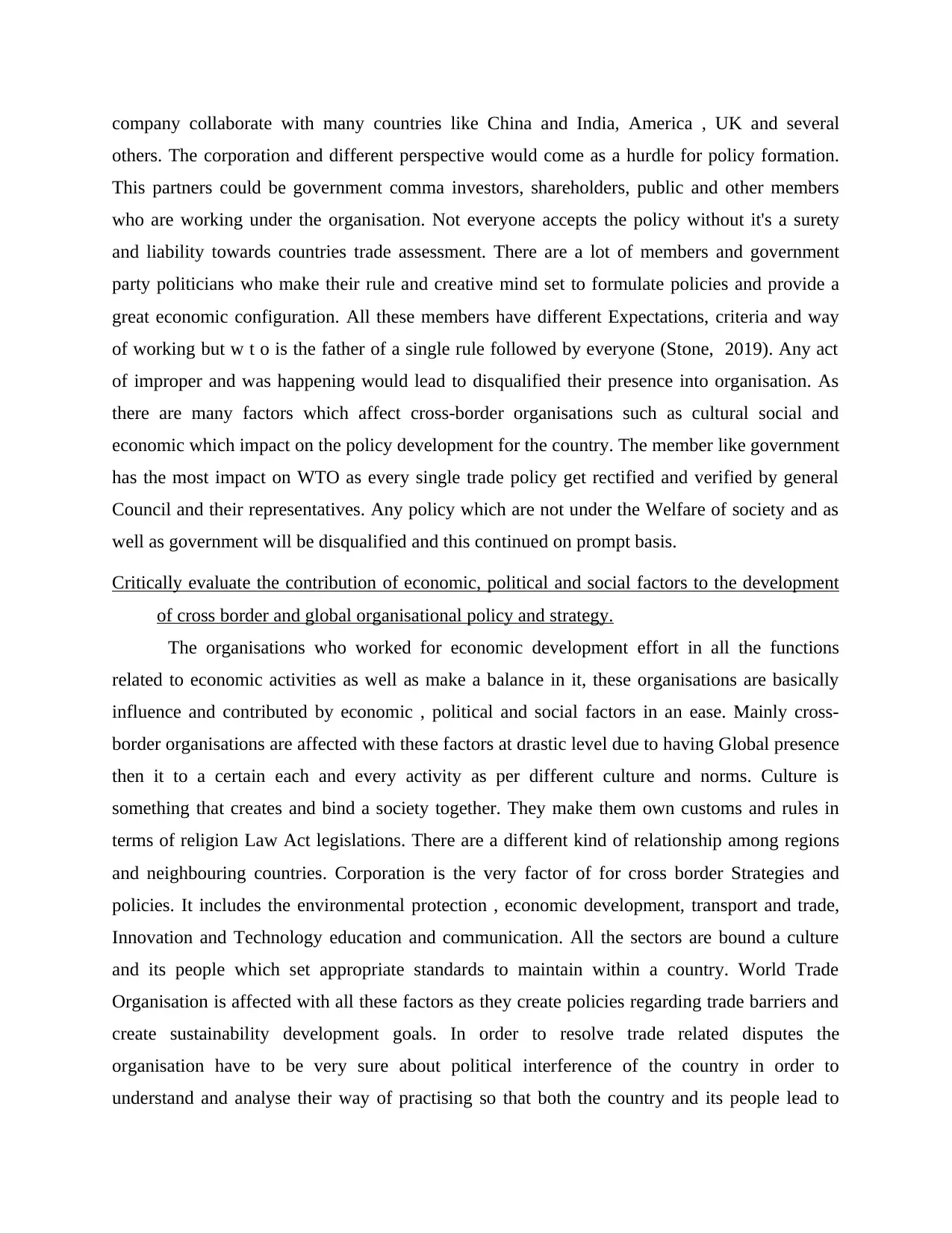
company collaborate with many countries like China and India, America , UK and several
others. The corporation and different perspective would come as a hurdle for policy formation.
This partners could be government comma investors, shareholders, public and other members
who are working under the organisation. Not everyone accepts the policy without it's a surety
and liability towards countries trade assessment. There are a lot of members and government
party politicians who make their rule and creative mind set to formulate policies and provide a
great economic configuration. All these members have different Expectations, criteria and way
of working but w t o is the father of a single rule followed by everyone (Stone, 2019). Any act
of improper and was happening would lead to disqualified their presence into organisation. As
there are many factors which affect cross-border organisations such as cultural social and
economic which impact on the policy development for the country. The member like government
has the most impact on WTO as every single trade policy get rectified and verified by general
Council and their representatives. Any policy which are not under the Welfare of society and as
well as government will be disqualified and this continued on prompt basis.
Critically evaluate the contribution of economic, political and social factors to the development
of cross border and global organisational policy and strategy.
The organisations who worked for economic development effort in all the functions
related to economic activities as well as make a balance in it, these organisations are basically
influence and contributed by economic , political and social factors in an ease. Mainly cross-
border organisations are affected with these factors at drastic level due to having Global presence
then it to a certain each and every activity as per different culture and norms. Culture is
something that creates and bind a society together. They make them own customs and rules in
terms of religion Law Act legislations. There are a different kind of relationship among regions
and neighbouring countries. Corporation is the very factor of for cross border Strategies and
policies. It includes the environmental protection , economic development, transport and trade,
Innovation and Technology education and communication. All the sectors are bound a culture
and its people which set appropriate standards to maintain within a country. World Trade
Organisation is affected with all these factors as they create policies regarding trade barriers and
create sustainability development goals. In order to resolve trade related disputes the
organisation have to be very sure about political interference of the country in order to
understand and analyse their way of practising so that both the country and its people lead to
others. The corporation and different perspective would come as a hurdle for policy formation.
This partners could be government comma investors, shareholders, public and other members
who are working under the organisation. Not everyone accepts the policy without it's a surety
and liability towards countries trade assessment. There are a lot of members and government
party politicians who make their rule and creative mind set to formulate policies and provide a
great economic configuration. All these members have different Expectations, criteria and way
of working but w t o is the father of a single rule followed by everyone (Stone, 2019). Any act
of improper and was happening would lead to disqualified their presence into organisation. As
there are many factors which affect cross-border organisations such as cultural social and
economic which impact on the policy development for the country. The member like government
has the most impact on WTO as every single trade policy get rectified and verified by general
Council and their representatives. Any policy which are not under the Welfare of society and as
well as government will be disqualified and this continued on prompt basis.
Critically evaluate the contribution of economic, political and social factors to the development
of cross border and global organisational policy and strategy.
The organisations who worked for economic development effort in all the functions
related to economic activities as well as make a balance in it, these organisations are basically
influence and contributed by economic , political and social factors in an ease. Mainly cross-
border organisations are affected with these factors at drastic level due to having Global presence
then it to a certain each and every activity as per different culture and norms. Culture is
something that creates and bind a society together. They make them own customs and rules in
terms of religion Law Act legislations. There are a different kind of relationship among regions
and neighbouring countries. Corporation is the very factor of for cross border Strategies and
policies. It includes the environmental protection , economic development, transport and trade,
Innovation and Technology education and communication. All the sectors are bound a culture
and its people which set appropriate standards to maintain within a country. World Trade
Organisation is affected with all these factors as they create policies regarding trade barriers and
create sustainability development goals. In order to resolve trade related disputes the
organisation have to be very sure about political interference of the country in order to
understand and analyse their way of practising so that both the country and its people lead to
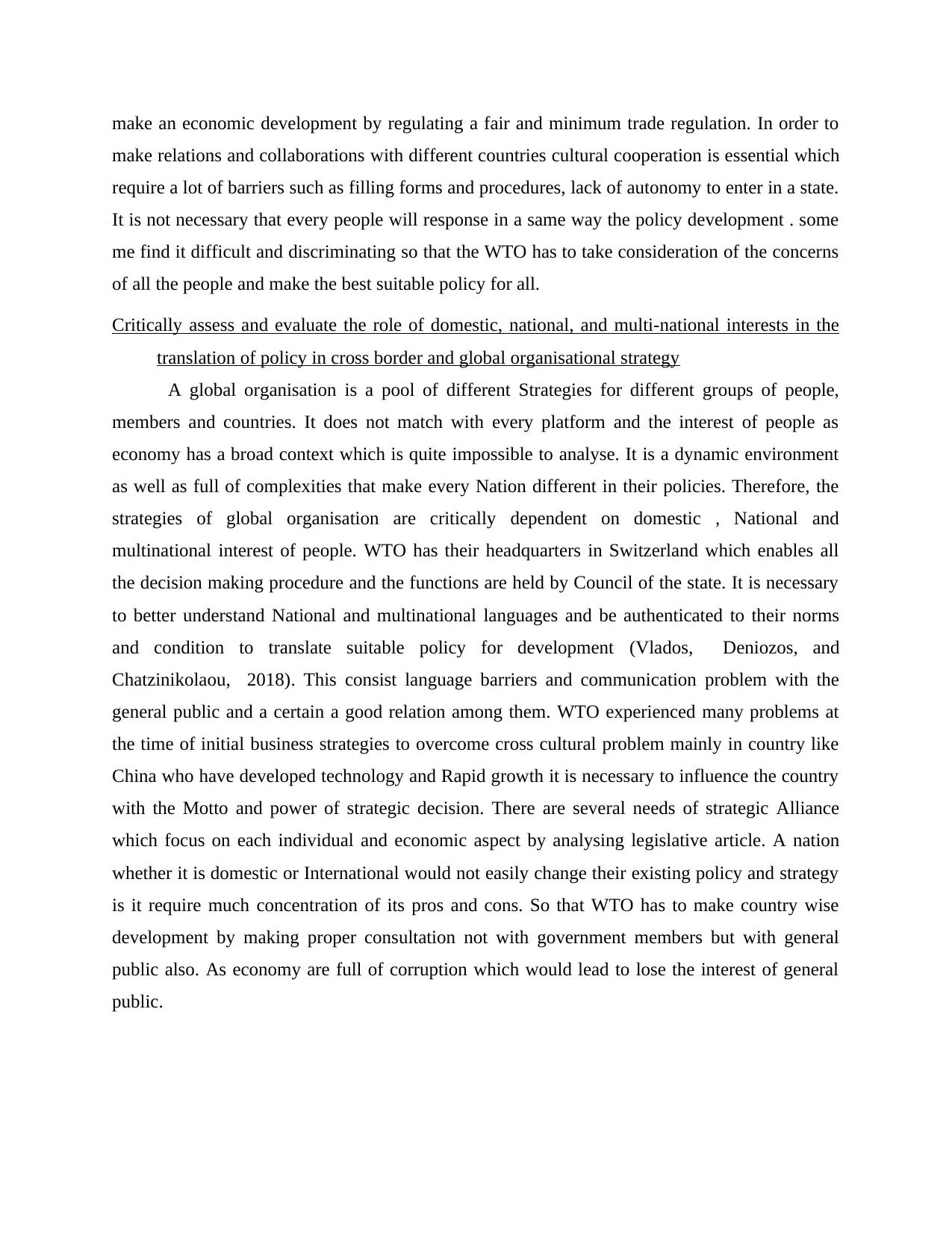
make an economic development by regulating a fair and minimum trade regulation. In order to
make relations and collaborations with different countries cultural cooperation is essential which
require a lot of barriers such as filling forms and procedures, lack of autonomy to enter in a state.
It is not necessary that every people will response in a same way the policy development . some
me find it difficult and discriminating so that the WTO has to take consideration of the concerns
of all the people and make the best suitable policy for all.
Critically assess and evaluate the role of domestic, national, and multi-national interests in the
translation of policy in cross border and global organisational strategy
A global organisation is a pool of different Strategies for different groups of people,
members and countries. It does not match with every platform and the interest of people as
economy has a broad context which is quite impossible to analyse. It is a dynamic environment
as well as full of complexities that make every Nation different in their policies. Therefore, the
strategies of global organisation are critically dependent on domestic , National and
multinational interest of people. WTO has their headquarters in Switzerland which enables all
the decision making procedure and the functions are held by Council of the state. It is necessary
to better understand National and multinational languages and be authenticated to their norms
and condition to translate suitable policy for development (Vlados, Deniozos, and
Chatzinikolaou, 2018). This consist language barriers and communication problem with the
general public and a certain a good relation among them. WTO experienced many problems at
the time of initial business strategies to overcome cross cultural problem mainly in country like
China who have developed technology and Rapid growth it is necessary to influence the country
with the Motto and power of strategic decision. There are several needs of strategic Alliance
which focus on each individual and economic aspect by analysing legislative article. A nation
whether it is domestic or International would not easily change their existing policy and strategy
is it require much concentration of its pros and cons. So that WTO has to make country wise
development by making proper consultation not with government members but with general
public also. As economy are full of corruption which would lead to lose the interest of general
public.
make relations and collaborations with different countries cultural cooperation is essential which
require a lot of barriers such as filling forms and procedures, lack of autonomy to enter in a state.
It is not necessary that every people will response in a same way the policy development . some
me find it difficult and discriminating so that the WTO has to take consideration of the concerns
of all the people and make the best suitable policy for all.
Critically assess and evaluate the role of domestic, national, and multi-national interests in the
translation of policy in cross border and global organisational strategy
A global organisation is a pool of different Strategies for different groups of people,
members and countries. It does not match with every platform and the interest of people as
economy has a broad context which is quite impossible to analyse. It is a dynamic environment
as well as full of complexities that make every Nation different in their policies. Therefore, the
strategies of global organisation are critically dependent on domestic , National and
multinational interest of people. WTO has their headquarters in Switzerland which enables all
the decision making procedure and the functions are held by Council of the state. It is necessary
to better understand National and multinational languages and be authenticated to their norms
and condition to translate suitable policy for development (Vlados, Deniozos, and
Chatzinikolaou, 2018). This consist language barriers and communication problem with the
general public and a certain a good relation among them. WTO experienced many problems at
the time of initial business strategies to overcome cross cultural problem mainly in country like
China who have developed technology and Rapid growth it is necessary to influence the country
with the Motto and power of strategic decision. There are several needs of strategic Alliance
which focus on each individual and economic aspect by analysing legislative article. A nation
whether it is domestic or International would not easily change their existing policy and strategy
is it require much concentration of its pros and cons. So that WTO has to make country wise
development by making proper consultation not with government members but with general
public also. As economy are full of corruption which would lead to lose the interest of general
public.
⊘ This is a preview!⊘
Do you want full access?
Subscribe today to unlock all pages.

Trusted by 1+ million students worldwide
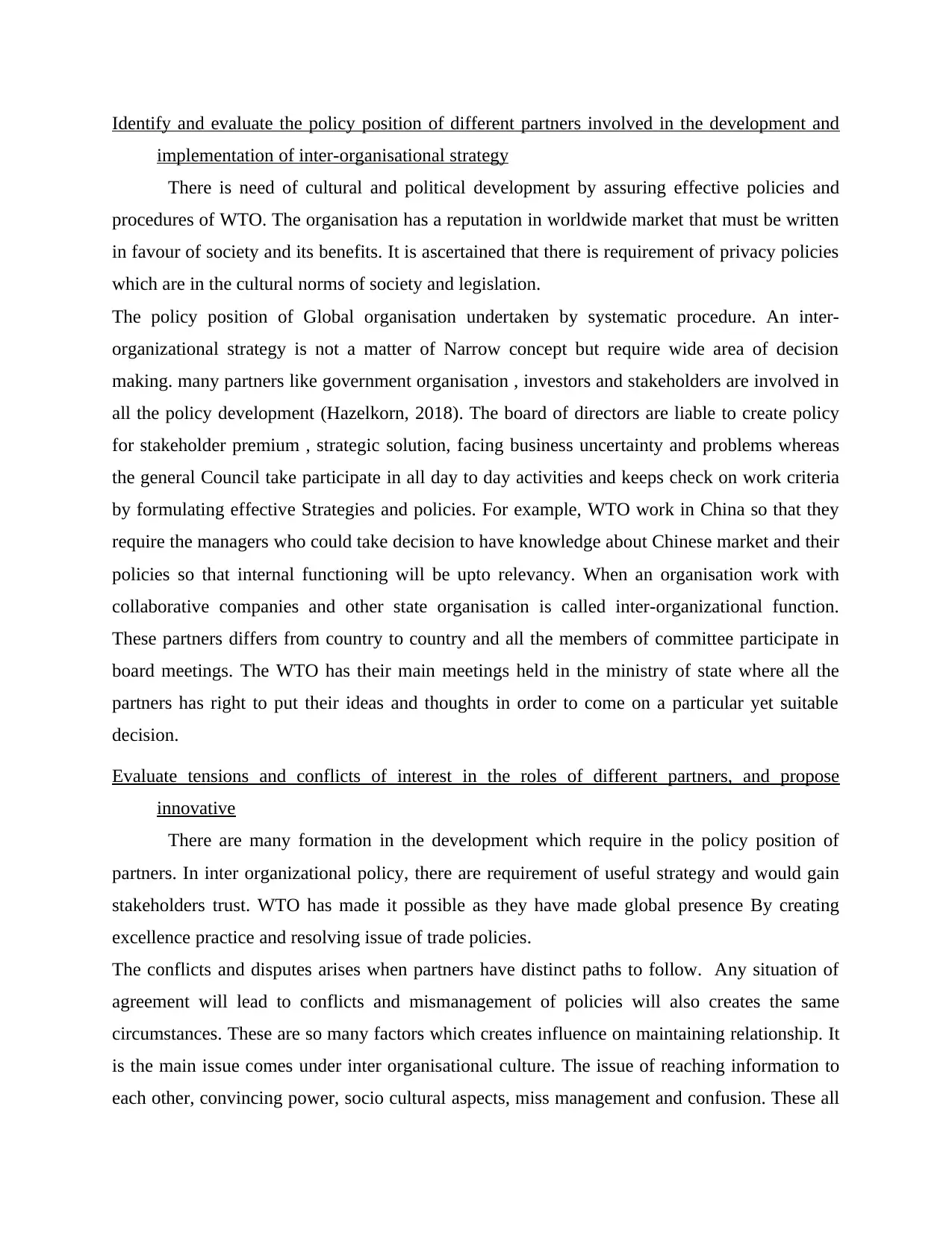
Identify and evaluate the policy position of different partners involved in the development and
implementation of inter-organisational strategy
There is need of cultural and political development by assuring effective policies and
procedures of WTO. The organisation has a reputation in worldwide market that must be written
in favour of society and its benefits. It is ascertained that there is requirement of privacy policies
which are in the cultural norms of society and legislation.
The policy position of Global organisation undertaken by systematic procedure. An inter-
organizational strategy is not a matter of Narrow concept but require wide area of decision
making. many partners like government organisation , investors and stakeholders are involved in
all the policy development (Hazelkorn, 2018). The board of directors are liable to create policy
for stakeholder premium , strategic solution, facing business uncertainty and problems whereas
the general Council take participate in all day to day activities and keeps check on work criteria
by formulating effective Strategies and policies. For example, WTO work in China so that they
require the managers who could take decision to have knowledge about Chinese market and their
policies so that internal functioning will be upto relevancy. When an organisation work with
collaborative companies and other state organisation is called inter-organizational function.
These partners differs from country to country and all the members of committee participate in
board meetings. The WTO has their main meetings held in the ministry of state where all the
partners has right to put their ideas and thoughts in order to come on a particular yet suitable
decision.
Evaluate tensions and conflicts of interest in the roles of different partners, and propose
innovative
There are many formation in the development which require in the policy position of
partners. In inter organizational policy, there are requirement of useful strategy and would gain
stakeholders trust. WTO has made it possible as they have made global presence By creating
excellence practice and resolving issue of trade policies.
The conflicts and disputes arises when partners have distinct paths to follow. Any situation of
agreement will lead to conflicts and mismanagement of policies will also creates the same
circumstances. These are so many factors which creates influence on maintaining relationship. It
is the main issue comes under inter organisational culture. The issue of reaching information to
each other, convincing power, socio cultural aspects, miss management and confusion. These all
implementation of inter-organisational strategy
There is need of cultural and political development by assuring effective policies and
procedures of WTO. The organisation has a reputation in worldwide market that must be written
in favour of society and its benefits. It is ascertained that there is requirement of privacy policies
which are in the cultural norms of society and legislation.
The policy position of Global organisation undertaken by systematic procedure. An inter-
organizational strategy is not a matter of Narrow concept but require wide area of decision
making. many partners like government organisation , investors and stakeholders are involved in
all the policy development (Hazelkorn, 2018). The board of directors are liable to create policy
for stakeholder premium , strategic solution, facing business uncertainty and problems whereas
the general Council take participate in all day to day activities and keeps check on work criteria
by formulating effective Strategies and policies. For example, WTO work in China so that they
require the managers who could take decision to have knowledge about Chinese market and their
policies so that internal functioning will be upto relevancy. When an organisation work with
collaborative companies and other state organisation is called inter-organizational function.
These partners differs from country to country and all the members of committee participate in
board meetings. The WTO has their main meetings held in the ministry of state where all the
partners has right to put their ideas and thoughts in order to come on a particular yet suitable
decision.
Evaluate tensions and conflicts of interest in the roles of different partners, and propose
innovative
There are many formation in the development which require in the policy position of
partners. In inter organizational policy, there are requirement of useful strategy and would gain
stakeholders trust. WTO has made it possible as they have made global presence By creating
excellence practice and resolving issue of trade policies.
The conflicts and disputes arises when partners have distinct paths to follow. Any situation of
agreement will lead to conflicts and mismanagement of policies will also creates the same
circumstances. These are so many factors which creates influence on maintaining relationship. It
is the main issue comes under inter organisational culture. The issue of reaching information to
each other, convincing power, socio cultural aspects, miss management and confusion. These all
Paraphrase This Document
Need a fresh take? Get an instant paraphrase of this document with our AI Paraphraser
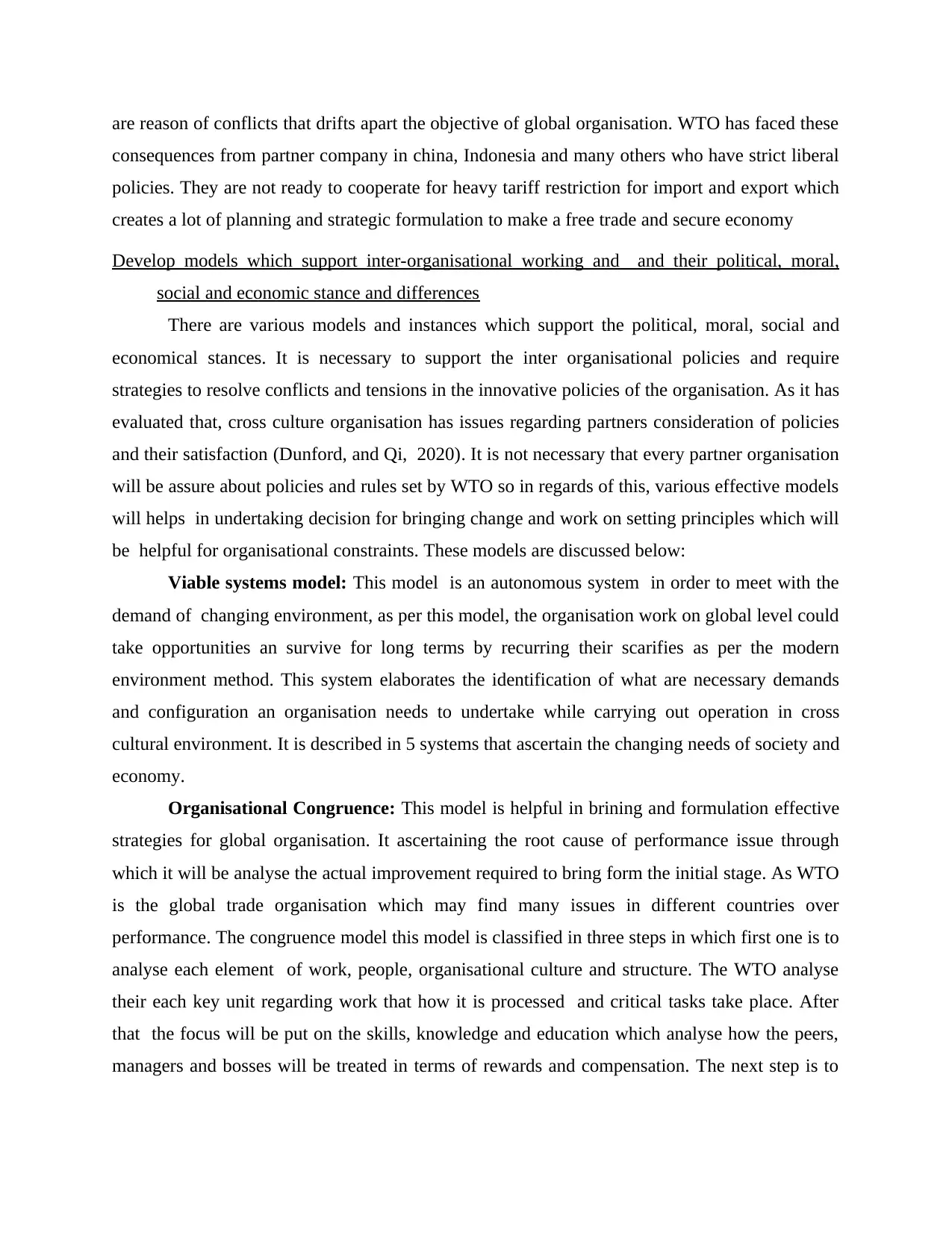
are reason of conflicts that drifts apart the objective of global organisation. WTO has faced these
consequences from partner company in china, Indonesia and many others who have strict liberal
policies. They are not ready to cooperate for heavy tariff restriction for import and export which
creates a lot of planning and strategic formulation to make a free trade and secure economy
Develop models which support inter-organisational working and and their political, moral,
social and economic stance and differences
There are various models and instances which support the political, moral, social and
economical stances. It is necessary to support the inter organisational policies and require
strategies to resolve conflicts and tensions in the innovative policies of the organisation. As it has
evaluated that, cross culture organisation has issues regarding partners consideration of policies
and their satisfaction (Dunford, and Qi, 2020). It is not necessary that every partner organisation
will be assure about policies and rules set by WTO so in regards of this, various effective models
will helps in undertaking decision for bringing change and work on setting principles which will
be helpful for organisational constraints. These models are discussed below:
Viable systems model: This model is an autonomous system in order to meet with the
demand of changing environment, as per this model, the organisation work on global level could
take opportunities an survive for long terms by recurring their scarifies as per the modern
environment method. This system elaborates the identification of what are necessary demands
and configuration an organisation needs to undertake while carrying out operation in cross
cultural environment. It is described in 5 systems that ascertain the changing needs of society and
economy.
Organisational Congruence: This model is helpful in brining and formulation effective
strategies for global organisation. It ascertaining the root cause of performance issue through
which it will be analyse the actual improvement required to bring form the initial stage. As WTO
is the global trade organisation which may find many issues in different countries over
performance. The congruence model this model is classified in three steps in which first one is to
analyse each element of work, people, organisational culture and structure. The WTO analyse
their each key unit regarding work that how it is processed and critical tasks take place. After
that the focus will be put on the skills, knowledge and education which analyse how the peers,
managers and bosses will be treated in terms of rewards and compensation. The next step is to
consequences from partner company in china, Indonesia and many others who have strict liberal
policies. They are not ready to cooperate for heavy tariff restriction for import and export which
creates a lot of planning and strategic formulation to make a free trade and secure economy
Develop models which support inter-organisational working and and their political, moral,
social and economic stance and differences
There are various models and instances which support the political, moral, social and
economical stances. It is necessary to support the inter organisational policies and require
strategies to resolve conflicts and tensions in the innovative policies of the organisation. As it has
evaluated that, cross culture organisation has issues regarding partners consideration of policies
and their satisfaction (Dunford, and Qi, 2020). It is not necessary that every partner organisation
will be assure about policies and rules set by WTO so in regards of this, various effective models
will helps in undertaking decision for bringing change and work on setting principles which will
be helpful for organisational constraints. These models are discussed below:
Viable systems model: This model is an autonomous system in order to meet with the
demand of changing environment, as per this model, the organisation work on global level could
take opportunities an survive for long terms by recurring their scarifies as per the modern
environment method. This system elaborates the identification of what are necessary demands
and configuration an organisation needs to undertake while carrying out operation in cross
cultural environment. It is described in 5 systems that ascertain the changing needs of society and
economy.
Organisational Congruence: This model is helpful in brining and formulation effective
strategies for global organisation. It ascertaining the root cause of performance issue through
which it will be analyse the actual improvement required to bring form the initial stage. As WTO
is the global trade organisation which may find many issues in different countries over
performance. The congruence model this model is classified in three steps in which first one is to
analyse each element of work, people, organisational culture and structure. The WTO analyse
their each key unit regarding work that how it is processed and critical tasks take place. After
that the focus will be put on the skills, knowledge and education which analyse how the peers,
managers and bosses will be treated in terms of rewards and compensation. The next step is to
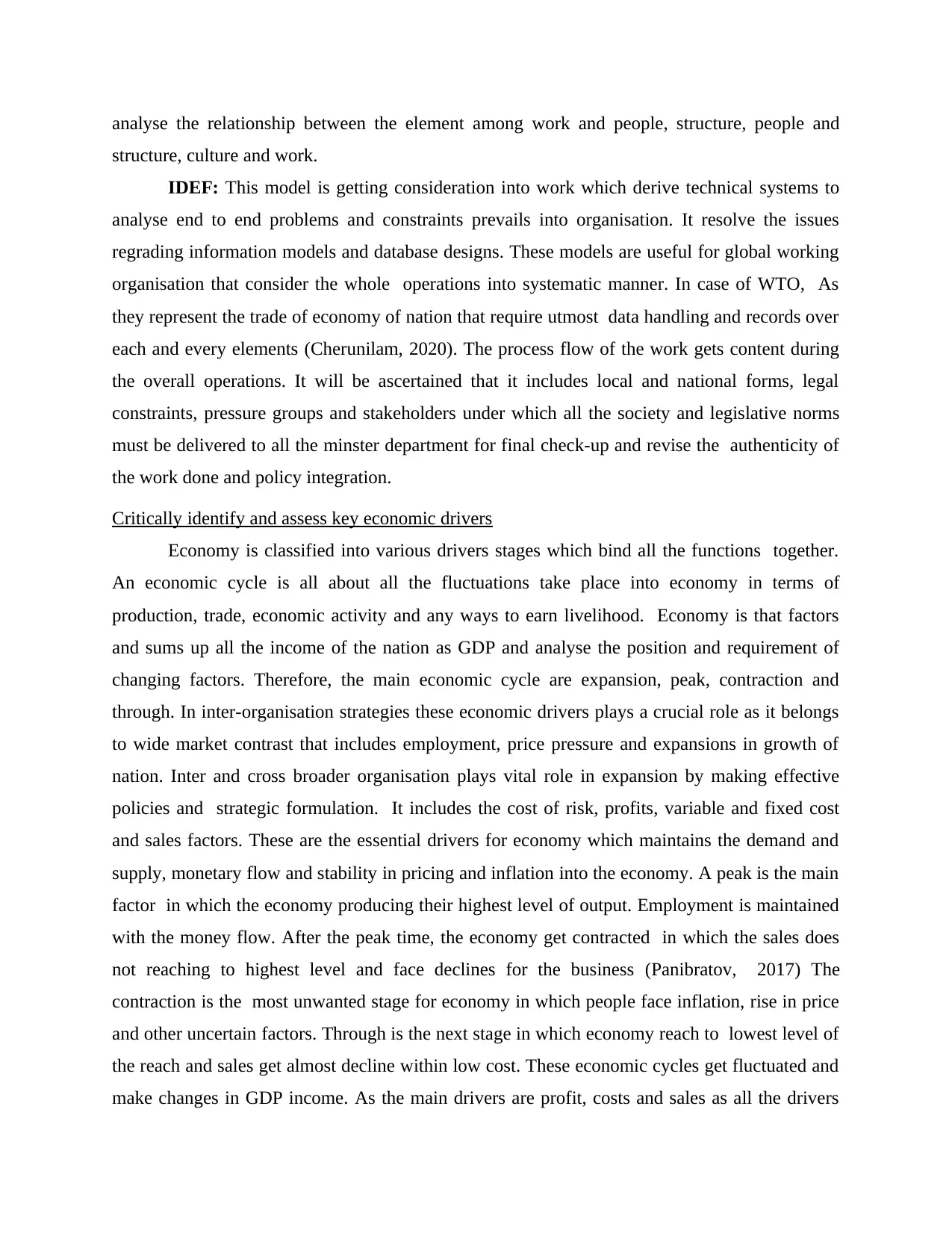
analyse the relationship between the element among work and people, structure, people and
structure, culture and work.
IDEF: This model is getting consideration into work which derive technical systems to
analyse end to end problems and constraints prevails into organisation. It resolve the issues
regrading information models and database designs. These models are useful for global working
organisation that consider the whole operations into systematic manner. In case of WTO, As
they represent the trade of economy of nation that require utmost data handling and records over
each and every elements (Cherunilam, 2020). The process flow of the work gets content during
the overall operations. It will be ascertained that it includes local and national forms, legal
constraints, pressure groups and stakeholders under which all the society and legislative norms
must be delivered to all the minster department for final check-up and revise the authenticity of
the work done and policy integration.
Critically identify and assess key economic drivers
Economy is classified into various drivers stages which bind all the functions together.
An economic cycle is all about all the fluctuations take place into economy in terms of
production, trade, economic activity and any ways to earn livelihood. Economy is that factors
and sums up all the income of the nation as GDP and analyse the position and requirement of
changing factors. Therefore, the main economic cycle are expansion, peak, contraction and
through. In inter-organisation strategies these economic drivers plays a crucial role as it belongs
to wide market contrast that includes employment, price pressure and expansions in growth of
nation. Inter and cross broader organisation plays vital role in expansion by making effective
policies and strategic formulation. It includes the cost of risk, profits, variable and fixed cost
and sales factors. These are the essential drivers for economy which maintains the demand and
supply, monetary flow and stability in pricing and inflation into the economy. A peak is the main
factor in which the economy producing their highest level of output. Employment is maintained
with the money flow. After the peak time, the economy get contracted in which the sales does
not reaching to highest level and face declines for the business (Panibratov, 2017) The
contraction is the most unwanted stage for economy in which people face inflation, rise in price
and other uncertain factors. Through is the next stage in which economy reach to lowest level of
the reach and sales get almost decline within low cost. These economic cycles get fluctuated and
make changes in GDP income. As the main drivers are profit, costs and sales as all the drivers
structure, culture and work.
IDEF: This model is getting consideration into work which derive technical systems to
analyse end to end problems and constraints prevails into organisation. It resolve the issues
regrading information models and database designs. These models are useful for global working
organisation that consider the whole operations into systematic manner. In case of WTO, As
they represent the trade of economy of nation that require utmost data handling and records over
each and every elements (Cherunilam, 2020). The process flow of the work gets content during
the overall operations. It will be ascertained that it includes local and national forms, legal
constraints, pressure groups and stakeholders under which all the society and legislative norms
must be delivered to all the minster department for final check-up and revise the authenticity of
the work done and policy integration.
Critically identify and assess key economic drivers
Economy is classified into various drivers stages which bind all the functions together.
An economic cycle is all about all the fluctuations take place into economy in terms of
production, trade, economic activity and any ways to earn livelihood. Economy is that factors
and sums up all the income of the nation as GDP and analyse the position and requirement of
changing factors. Therefore, the main economic cycle are expansion, peak, contraction and
through. In inter-organisation strategies these economic drivers plays a crucial role as it belongs
to wide market contrast that includes employment, price pressure and expansions in growth of
nation. Inter and cross broader organisation plays vital role in expansion by making effective
policies and strategic formulation. It includes the cost of risk, profits, variable and fixed cost
and sales factors. These are the essential drivers for economy which maintains the demand and
supply, monetary flow and stability in pricing and inflation into the economy. A peak is the main
factor in which the economy producing their highest level of output. Employment is maintained
with the money flow. After the peak time, the economy get contracted in which the sales does
not reaching to highest level and face declines for the business (Panibratov, 2017) The
contraction is the most unwanted stage for economy in which people face inflation, rise in price
and other uncertain factors. Through is the next stage in which economy reach to lowest level of
the reach and sales get almost decline within low cost. These economic cycles get fluctuated and
make changes in GDP income. As the main drivers are profit, costs and sales as all the drivers
⊘ This is a preview!⊘
Do you want full access?
Subscribe today to unlock all pages.

Trusted by 1+ million students worldwide
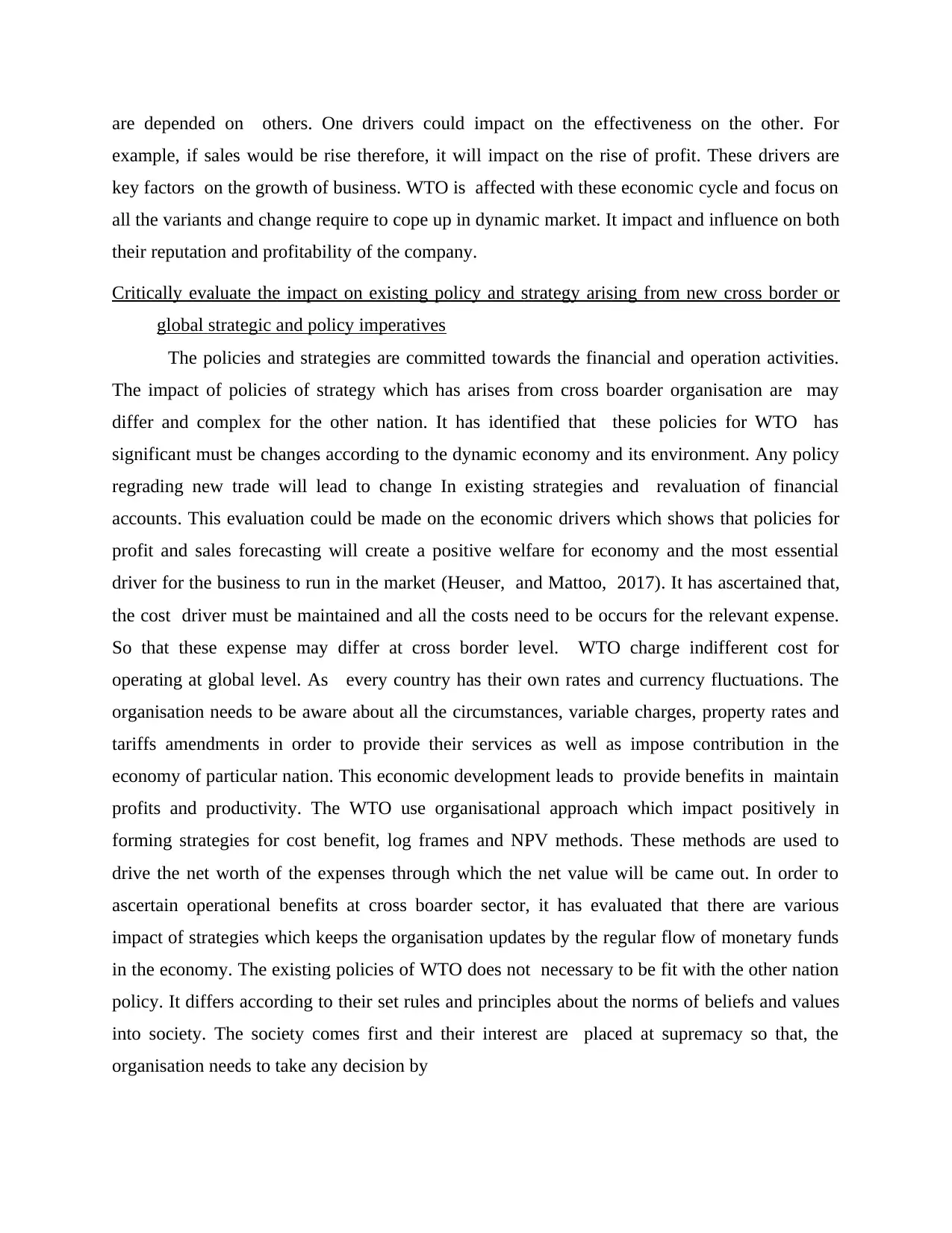
are depended on others. One drivers could impact on the effectiveness on the other. For
example, if sales would be rise therefore, it will impact on the rise of profit. These drivers are
key factors on the growth of business. WTO is affected with these economic cycle and focus on
all the variants and change require to cope up in dynamic market. It impact and influence on both
their reputation and profitability of the company.
Critically evaluate the impact on existing policy and strategy arising from new cross border or
global strategic and policy imperatives
The policies and strategies are committed towards the financial and operation activities.
The impact of policies of strategy which has arises from cross boarder organisation are may
differ and complex for the other nation. It has identified that these policies for WTO has
significant must be changes according to the dynamic economy and its environment. Any policy
regrading new trade will lead to change In existing strategies and revaluation of financial
accounts. This evaluation could be made on the economic drivers which shows that policies for
profit and sales forecasting will create a positive welfare for economy and the most essential
driver for the business to run in the market (Heuser, and Mattoo, 2017). It has ascertained that,
the cost driver must be maintained and all the costs need to be occurs for the relevant expense.
So that these expense may differ at cross border level. WTO charge indifferent cost for
operating at global level. As every country has their own rates and currency fluctuations. The
organisation needs to be aware about all the circumstances, variable charges, property rates and
tariffs amendments in order to provide their services as well as impose contribution in the
economy of particular nation. This economic development leads to provide benefits in maintain
profits and productivity. The WTO use organisational approach which impact positively in
forming strategies for cost benefit, log frames and NPV methods. These methods are used to
drive the net worth of the expenses through which the net value will be came out. In order to
ascertain operational benefits at cross boarder sector, it has evaluated that there are various
impact of strategies which keeps the organisation updates by the regular flow of monetary funds
in the economy. The existing policies of WTO does not necessary to be fit with the other nation
policy. It differs according to their set rules and principles about the norms of beliefs and values
into society. The society comes first and their interest are placed at supremacy so that, the
organisation needs to take any decision by
example, if sales would be rise therefore, it will impact on the rise of profit. These drivers are
key factors on the growth of business. WTO is affected with these economic cycle and focus on
all the variants and change require to cope up in dynamic market. It impact and influence on both
their reputation and profitability of the company.
Critically evaluate the impact on existing policy and strategy arising from new cross border or
global strategic and policy imperatives
The policies and strategies are committed towards the financial and operation activities.
The impact of policies of strategy which has arises from cross boarder organisation are may
differ and complex for the other nation. It has identified that these policies for WTO has
significant must be changes according to the dynamic economy and its environment. Any policy
regrading new trade will lead to change In existing strategies and revaluation of financial
accounts. This evaluation could be made on the economic drivers which shows that policies for
profit and sales forecasting will create a positive welfare for economy and the most essential
driver for the business to run in the market (Heuser, and Mattoo, 2017). It has ascertained that,
the cost driver must be maintained and all the costs need to be occurs for the relevant expense.
So that these expense may differ at cross border level. WTO charge indifferent cost for
operating at global level. As every country has their own rates and currency fluctuations. The
organisation needs to be aware about all the circumstances, variable charges, property rates and
tariffs amendments in order to provide their services as well as impose contribution in the
economy of particular nation. This economic development leads to provide benefits in maintain
profits and productivity. The WTO use organisational approach which impact positively in
forming strategies for cost benefit, log frames and NPV methods. These methods are used to
drive the net worth of the expenses through which the net value will be came out. In order to
ascertain operational benefits at cross boarder sector, it has evaluated that there are various
impact of strategies which keeps the organisation updates by the regular flow of monetary funds
in the economy. The existing policies of WTO does not necessary to be fit with the other nation
policy. It differs according to their set rules and principles about the norms of beliefs and values
into society. The society comes first and their interest are placed at supremacy so that, the
organisation needs to take any decision by
Paraphrase This Document
Need a fresh take? Get an instant paraphrase of this document with our AI Paraphraser
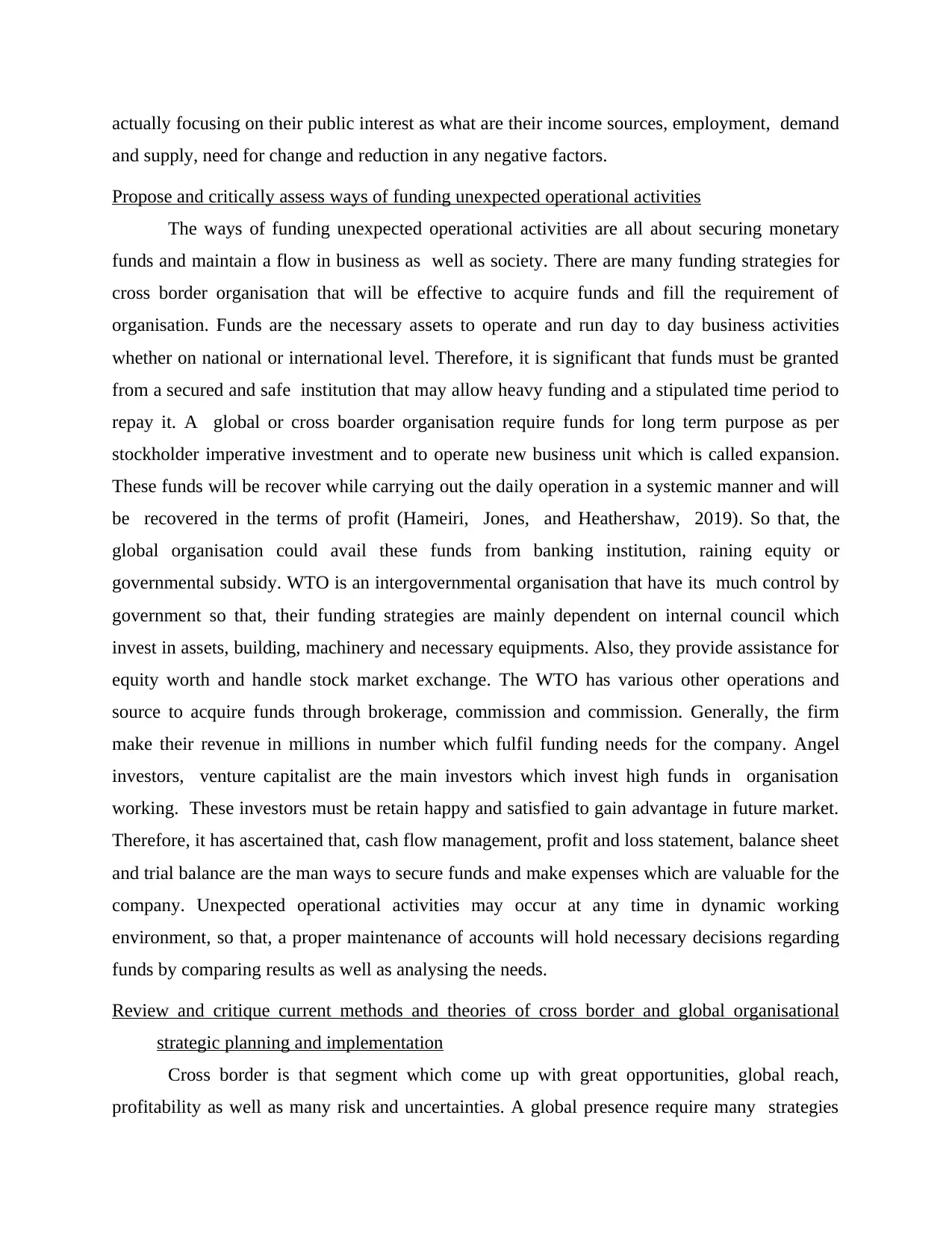
actually focusing on their public interest as what are their income sources, employment, demand
and supply, need for change and reduction in any negative factors.
Propose and critically assess ways of funding unexpected operational activities
The ways of funding unexpected operational activities are all about securing monetary
funds and maintain a flow in business as well as society. There are many funding strategies for
cross border organisation that will be effective to acquire funds and fill the requirement of
organisation. Funds are the necessary assets to operate and run day to day business activities
whether on national or international level. Therefore, it is significant that funds must be granted
from a secured and safe institution that may allow heavy funding and a stipulated time period to
repay it. A global or cross boarder organisation require funds for long term purpose as per
stockholder imperative investment and to operate new business unit which is called expansion.
These funds will be recover while carrying out the daily operation in a systemic manner and will
be recovered in the terms of profit (Hameiri, Jones, and Heathershaw, 2019). So that, the
global organisation could avail these funds from banking institution, raining equity or
governmental subsidy. WTO is an intergovernmental organisation that have its much control by
government so that, their funding strategies are mainly dependent on internal council which
invest in assets, building, machinery and necessary equipments. Also, they provide assistance for
equity worth and handle stock market exchange. The WTO has various other operations and
source to acquire funds through brokerage, commission and commission. Generally, the firm
make their revenue in millions in number which fulfil funding needs for the company. Angel
investors, venture capitalist are the main investors which invest high funds in organisation
working. These investors must be retain happy and satisfied to gain advantage in future market.
Therefore, it has ascertained that, cash flow management, profit and loss statement, balance sheet
and trial balance are the man ways to secure funds and make expenses which are valuable for the
company. Unexpected operational activities may occur at any time in dynamic working
environment, so that, a proper maintenance of accounts will hold necessary decisions regarding
funds by comparing results as well as analysing the needs.
Review and critique current methods and theories of cross border and global organisational
strategic planning and implementation
Cross border is that segment which come up with great opportunities, global reach,
profitability as well as many risk and uncertainties. A global presence require many strategies
and supply, need for change and reduction in any negative factors.
Propose and critically assess ways of funding unexpected operational activities
The ways of funding unexpected operational activities are all about securing monetary
funds and maintain a flow in business as well as society. There are many funding strategies for
cross border organisation that will be effective to acquire funds and fill the requirement of
organisation. Funds are the necessary assets to operate and run day to day business activities
whether on national or international level. Therefore, it is significant that funds must be granted
from a secured and safe institution that may allow heavy funding and a stipulated time period to
repay it. A global or cross boarder organisation require funds for long term purpose as per
stockholder imperative investment and to operate new business unit which is called expansion.
These funds will be recover while carrying out the daily operation in a systemic manner and will
be recovered in the terms of profit (Hameiri, Jones, and Heathershaw, 2019). So that, the
global organisation could avail these funds from banking institution, raining equity or
governmental subsidy. WTO is an intergovernmental organisation that have its much control by
government so that, their funding strategies are mainly dependent on internal council which
invest in assets, building, machinery and necessary equipments. Also, they provide assistance for
equity worth and handle stock market exchange. The WTO has various other operations and
source to acquire funds through brokerage, commission and commission. Generally, the firm
make their revenue in millions in number which fulfil funding needs for the company. Angel
investors, venture capitalist are the main investors which invest high funds in organisation
working. These investors must be retain happy and satisfied to gain advantage in future market.
Therefore, it has ascertained that, cash flow management, profit and loss statement, balance sheet
and trial balance are the man ways to secure funds and make expenses which are valuable for the
company. Unexpected operational activities may occur at any time in dynamic working
environment, so that, a proper maintenance of accounts will hold necessary decisions regarding
funds by comparing results as well as analysing the needs.
Review and critique current methods and theories of cross border and global organisational
strategic planning and implementation
Cross border is that segment which come up with great opportunities, global reach,
profitability as well as many risk and uncertainties. A global presence require many strategies
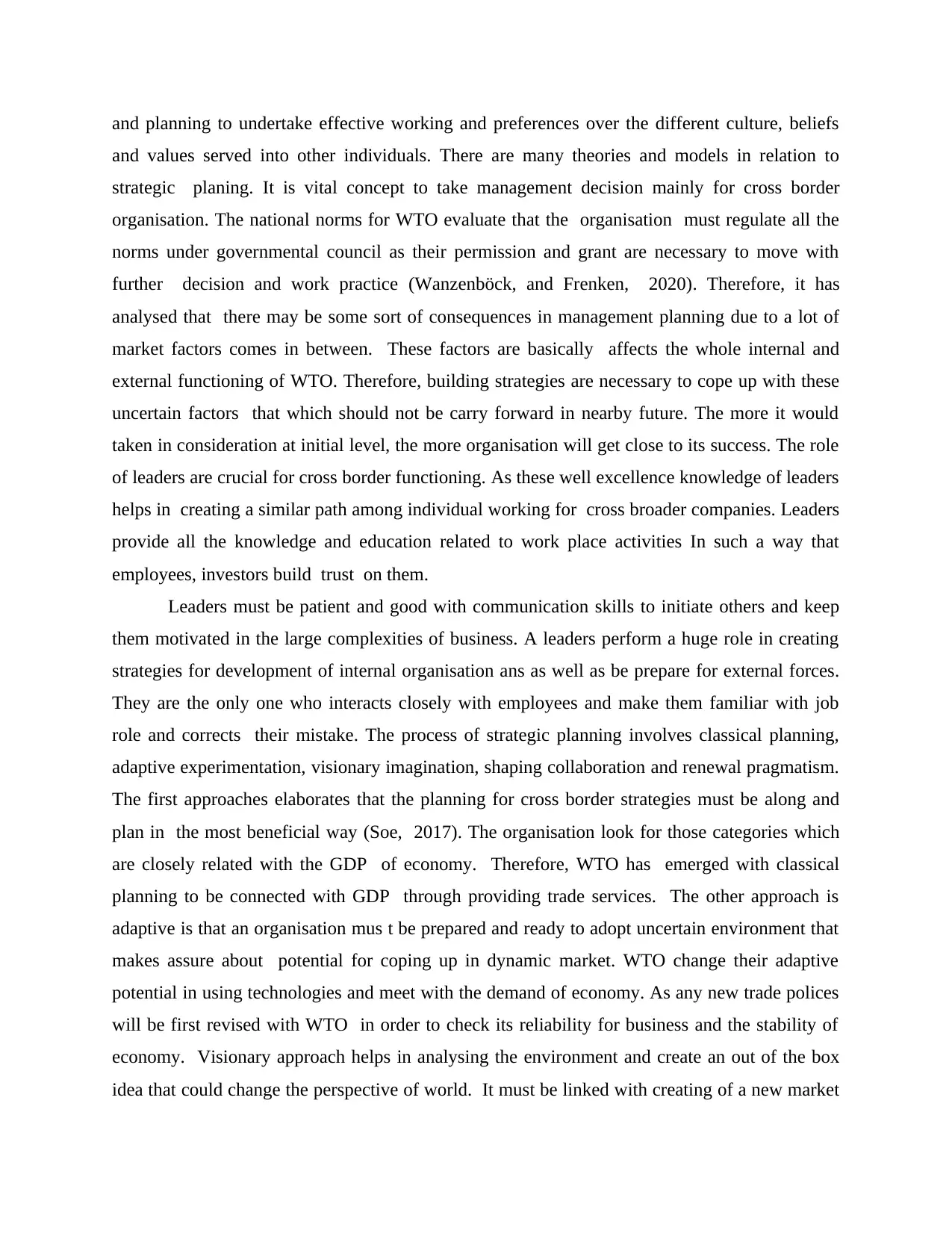
and planning to undertake effective working and preferences over the different culture, beliefs
and values served into other individuals. There are many theories and models in relation to
strategic planing. It is vital concept to take management decision mainly for cross border
organisation. The national norms for WTO evaluate that the organisation must regulate all the
norms under governmental council as their permission and grant are necessary to move with
further decision and work practice (Wanzenböck, and Frenken, 2020). Therefore, it has
analysed that there may be some sort of consequences in management planning due to a lot of
market factors comes in between. These factors are basically affects the whole internal and
external functioning of WTO. Therefore, building strategies are necessary to cope up with these
uncertain factors that which should not be carry forward in nearby future. The more it would
taken in consideration at initial level, the more organisation will get close to its success. The role
of leaders are crucial for cross border functioning. As these well excellence knowledge of leaders
helps in creating a similar path among individual working for cross broader companies. Leaders
provide all the knowledge and education related to work place activities In such a way that
employees, investors build trust on them.
Leaders must be patient and good with communication skills to initiate others and keep
them motivated in the large complexities of business. A leaders perform a huge role in creating
strategies for development of internal organisation ans as well as be prepare for external forces.
They are the only one who interacts closely with employees and make them familiar with job
role and corrects their mistake. The process of strategic planning involves classical planning,
adaptive experimentation, visionary imagination, shaping collaboration and renewal pragmatism.
The first approaches elaborates that the planning for cross border strategies must be along and
plan in the most beneficial way (Soe, 2017). The organisation look for those categories which
are closely related with the GDP of economy. Therefore, WTO has emerged with classical
planning to be connected with GDP through providing trade services. The other approach is
adaptive is that an organisation mus t be prepared and ready to adopt uncertain environment that
makes assure about potential for coping up in dynamic market. WTO change their adaptive
potential in using technologies and meet with the demand of economy. As any new trade polices
will be first revised with WTO in order to check its reliability for business and the stability of
economy. Visionary approach helps in analysing the environment and create an out of the box
idea that could change the perspective of world. It must be linked with creating of a new market
and values served into other individuals. There are many theories and models in relation to
strategic planing. It is vital concept to take management decision mainly for cross border
organisation. The national norms for WTO evaluate that the organisation must regulate all the
norms under governmental council as their permission and grant are necessary to move with
further decision and work practice (Wanzenböck, and Frenken, 2020). Therefore, it has
analysed that there may be some sort of consequences in management planning due to a lot of
market factors comes in between. These factors are basically affects the whole internal and
external functioning of WTO. Therefore, building strategies are necessary to cope up with these
uncertain factors that which should not be carry forward in nearby future. The more it would
taken in consideration at initial level, the more organisation will get close to its success. The role
of leaders are crucial for cross border functioning. As these well excellence knowledge of leaders
helps in creating a similar path among individual working for cross broader companies. Leaders
provide all the knowledge and education related to work place activities In such a way that
employees, investors build trust on them.
Leaders must be patient and good with communication skills to initiate others and keep
them motivated in the large complexities of business. A leaders perform a huge role in creating
strategies for development of internal organisation ans as well as be prepare for external forces.
They are the only one who interacts closely with employees and make them familiar with job
role and corrects their mistake. The process of strategic planning involves classical planning,
adaptive experimentation, visionary imagination, shaping collaboration and renewal pragmatism.
The first approaches elaborates that the planning for cross border strategies must be along and
plan in the most beneficial way (Soe, 2017). The organisation look for those categories which
are closely related with the GDP of economy. Therefore, WTO has emerged with classical
planning to be connected with GDP through providing trade services. The other approach is
adaptive is that an organisation mus t be prepared and ready to adopt uncertain environment that
makes assure about potential for coping up in dynamic market. WTO change their adaptive
potential in using technologies and meet with the demand of economy. As any new trade polices
will be first revised with WTO in order to check its reliability for business and the stability of
economy. Visionary approach helps in analysing the environment and create an out of the box
idea that could change the perspective of world. It must be linked with creating of a new market
⊘ This is a preview!⊘
Do you want full access?
Subscribe today to unlock all pages.

Trusted by 1+ million students worldwide
1 out of 19
Related Documents
Your All-in-One AI-Powered Toolkit for Academic Success.
+13062052269
info@desklib.com
Available 24*7 on WhatsApp / Email
![[object Object]](/_next/static/media/star-bottom.7253800d.svg)
Unlock your academic potential
Copyright © 2020–2026 A2Z Services. All Rights Reserved. Developed and managed by ZUCOL.



